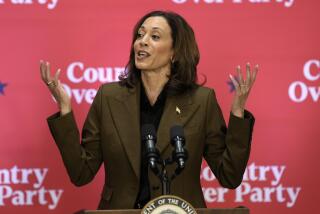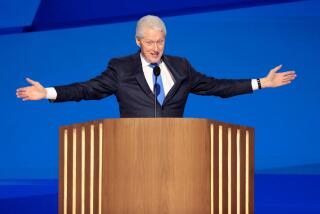Gore Camp Will Sell the Man, Not the Politician
- Share via
When friends from every significant moment of Al Gore’s life take the stage tonight at the Democratic National Convention, they will peel back the curtain on one of his campaign’s central strategic calculations.
To a far greater extent than rival George W. Bush, Gore is betting on biography as a means of reaching voters.
For the record:
12:00 a.m. Aug. 18, 2000 For the Record
Los Angeles Times Friday August 18, 2000 Home Edition Part A Part A Page 3 Metro Desk 2 inches; 44 words Type of Material: Correction
Convention photo--Some colors were distorted in a photograph Thursday of Hadassah Lieberman during her speech at the Democratic National Convention. Lieberman was wearing a blue dress as she introduced her husband, vice presidential candidate Joseph I. Lieberman, not a pink dress as the photograph showed.
Bush has talked less about his life story than almost any presidential candidate in recent memory. But inside the Gore camp, it has become an article of faith that the vice president cannot win the voters’ ears on policy until they like him better personally--and that voters will, in fact, like him more once they know more about him.
“Our principal communication goal, certainly through the next few weeks, is to get people to know Al Gore better as a person,” said Tad Devine, a senior advisor to the Gore campaign.
With that priority, the Gore campaign is making extraordinary efforts at this convention to highlight his life story. On Wednesday night, nominating speeches from actor Tommy Lee Jones and Gore’s daughter Karenna Gore Schiff struck highly personal notes; tonight, no fewer than nine friends--ranging from celebrated author David Halberstam to Gore’s brother-in-law Frank Hunger--will recount critical moments from the vice president’s past. Later, Gore’s wife, Tipper, will introduce him with a speech expected to focus more on their personal life than his public life.
In this emphasis on biography, the Gore campaign is confronting two distinct problems. Call them the Clinton problem and the Gore problem.
By stressing his family life, the campaign hopes to reclaim voters disappointed by Clinton’s personal behavior. Perhaps even more important, the campaign believes that fleshing out Gore’s life before Washington will soften perceptions of him as the consummate calculating politician--a man with more ambition than conviction.
“It’s essential that people begin to reevaluate him, because many people think he’s not quite honest, he’s a political opportunist, and they question his motivations,” said Andrew Kohut, director of the Pew Research Center for the People and the Press.
Tonight’s program--capped by Gore’s acceptance speech--may be the best, if not the last, opportunity for the vice president to change those crippling assessments. Unless he succeeds, his own senior aides believe he will have a hard time gaining much ground, even on issues where polls show that most Americans agree with him.
On that point, the Bush campaign agrees--although it is skeptical that Gore can solve the problem by filling in more details about his life before he was elected vice president in 1992. Bush advisors believe that voters who find Gore uninspiring or insincere today won’t necessarily change their views simply by learning more about his past.
“They are saying the same thing differently as I am: This guy has a messenger problem,” said Matthew Dowd, polling director for the Bush campaign. “People discount what he says, no matter what he does, unless they separate him from his political life. I just think it is going to be very difficult to convince the American people that there is an Al Gore who is not a politician.”
Gore’s camp recognizes that no single argument, or biographical fact, can convert voters who are skeptical about his motivations. But they believe, with a near religious conviction, that they can soften that resistance by framing his tenure as vice president inside a broader biographical picture that connects his experiences more closely to the lives of average Americans.
In that effort, the convention is stressing two central messages. One (which offers the added benefit of subtly separating him from Clinton) is “Al Gore: family man.” On Wednesday night, his daughter Karenna spoke intimately about the vice president as a father.
The other is “Al Gore: man of principle.” In his remarks, Tommy Lee Jones, a friend since college, tried to humanized Gore by recalling a young man who “shot pool . . . and watched Star Trek.” Other friends tonight, and likely Gore in his speech, will portray a religious and empathetic man who returned from Vietnam disillusioned by politics, pursued a newspaper reporting career and decided to run for Congress in 1976 only after concluding that it was the best way to improve society.
They will paint him as a committed legislator with a long history of pursuing tough fights.
All of this stands in stark contrast to what happened at the Republican convention. Apart from a brief reference in Laura Bush’s speech to her husband reading “Hop on Pop” to their twin daughters, and some broad reflections in Bush’s own speech about the baby boomers’ journey from rebellion to parenthood, the convention said almost nothing about his life story.
Gore aides say that is because there’s little in Bush’s life before his election as governor in 1994 that would attract voters. Dowd, the Bush pollster, said the reason for the light touch was that voters don’t really feel they need to know much more about Bush than that he is the governor of a large state and son of a former president.
“Voters really aren’t demanding more information about either [Bush or Gore],” Dowd said. “Each person’s biography, in their minds, qualifies them to be president. Once you meet that threshold, I don’t know what else biography gets you.”
The view in the Gore campaign couldn’t be more different.
Some there believe that the single most effective ad they ran during the primaries was a biographical spot that stressed these personal messages--versions of which are likely to reappear this fall.
“I think voters want to know about these guys first before they get into a big debate about who is going to do what,” Devine said. “I think that debate is the endgame.”
An axiom among Gore’s advisors is that the vice president is well known, but not known well--in other words, that although virtually everyone recognizes his name, few know much about him.
That may be. But voter assessments of Gore’s strengths and weaknesses have actually been quite stable in polling all year.
On the upside, surveys show that most voters see Gore as capable, experienced and smart. In the latest Times survey, Gore held clear leads over Bush when voters were asked which man has a better grasp of the issues, and the best experience for the job.
On the downside, some (though not all) surveys show that slightly more voters doubt his honesty and integrity than Bush’s. More consistent--and probably more important--polls find that most Americans consider Bush more likable and a stronger leader.
Gore is laboring under one other negative assessment: the belief that he is more calculating than candid.
With these perceptions of weakness and insincerity swirling around him, Gore’s problems essentially fuse those faced by Bill Clinton and Bush’s father, George Bush, at their first conventions.
In 1988, Bush arrived at his convention still battling the stereotype that he was a “wimp.” But Bush dispelled those doubts with a powerful acceptance speech that transformed him from the upper-crust bumbler that Democrats portrayed into a quiet man of hidden strengths. After that, he cruised to victory.
In 1992, Clinton arrived at his convention facing pervasive doubts about his honesty and sincerity. In extensive polling, his campaign discovered that voters--knowing little more about him than his education at elite schools and his maneuvering to avoid the draft during the Vietnam War--considered Clinton a child of privilege who had little in common with their lives.
In a memorable acceptance speech, though, Clinton highlighted his actual rise from modest roots and transformed his image into the “man from Hope”--a small town boy who was both a product and defender of the middle class. That redefinition helped bring him victory.
Gore aides believe they face a similar challenge this year. “It is a valid analogy to say we have to do the same kind of work with Al Gore that they had to do with Bill Clinton,” said Devine, the Gore advisor.
But Kohut, the Pew Research Center director, noted that Clinton had one significant advantage: He was less well known than Gore is today, which means impressions were easier to change.
“The chances people are going to have a complete redefinition of Gore are pretty slim,” Kohut said. “What can happen is they can begin to soften some of the hard edges on Gore’s image and make him more palatable to people who may prefer him on the issues.”
More to Read
Get the L.A. Times Politics newsletter
Deeply reported insights into legislation, politics and policy from Sacramento, Washington and beyond. In your inbox three times per week.
You may occasionally receive promotional content from the Los Angeles Times.










